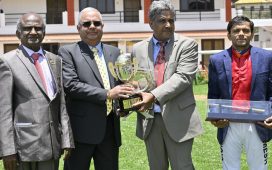The eponymously-named First Pharoah has a distinction shared by no other Thoroughbred. As the first offspring of Triple Crown hero American Pharoah, the colt made headlines soon after he was born on Jan. 3, 2017. Three years later, First Pharoah has displayed more of a likeness to his dam rather than favoring his sire, who quickly proved himself as a source of quality runners.
First Pharoah showed little promise in training, so late last year owner/breeder Oussama Aboughazale (of International Equities Holdings and Sumaya U.S. Stable) sent him to Brooke Schafer and Tay Wienold to redirect his talent. The Lexington-based business partners are experienced in schooling off-track Thoroughbreds in general and members of the First Pharoah clan in particular. The women were first introduced to the family when a friend recommended them for First Pharoah’s dam Kakadu. A well-beaten ninth as a 2-year-old in her only start, Kakadu retired to the broodmare ranks but she experienced reproductive problems and never produced another foal. With Schafer handling the ground work and flat work and Wienold doing the jumping, Kakadu made a seamless transition to show horse. Now seven, Kakadu’s specialty is eventing, combining refined movements of dressage with jumping in open fields and arenas.
Aboughazale was so impressed with the refashioned Kakadu that he channeled First Pharoah and Kakadu’s half-brother Lock Keeper (by Quality Road) to them. Schafer and Wienold transformed Lock Keeper’s laid-back personality and athleticism into a willing pleasure mount and sold him to an amateur rider who enjoys dressage with him. As a racehorse, he was unplaced in two starts as a 3-year-old in 2019.
First Pharoah’s evolution has been slower than his relatives because of his physique. He is built like his dam with a stout body reminiscent of larger breeds so he was given plenty of downtime to develop into his frame.
“We ride him lightly just to keep him reminded about his job and to slowly mold him into the sport horse we know he is capable of becoming,” Schafer said. “Tay rode him first and he rode beautifully. She said he is one of the most comfortable horses she has ever sat on. She looked at me grinning during the first ride and said ‘I could sit this trot all day.’ ”

First Pharoah, pictured in late August
During this growing phase, First Pharoah mostly has been doing a whole lot of nothing while socializing with pasture mates and human friends.
“He is like a playful teenager who enjoys challenging his buddies to a game of tag when he’s feeling frisky,” Schafer said. “He loves his horse companions dearly and gets very attached to every horse we put with him. He lives outside 24/7 in a field with a large run-in shed but loves to come in on hot days and take a nap in his stall. He gets checked daily and gets lots of treats from the neighbors.”
Schafer and Wienold balance their sport horse business and recreational riding with full-time jobs. Schafer is a speech pathologist in a Central Kentucky public school system and supplements her income by selling her customized painted drinking glasses and other equine-centric artwork. Wienold is an accountant who moonlights with a monogramming service. In their OTTB endeavors, they have established a reputation for transforming their projects into reliable mounts for other activities and placing them with suitable owners. Both strive for the perfect match and offer advice for those obtaining an OTTB with fundamental retraining.
“Take your time and start with the basics,” Schafer said. “Most Thoroughbreds are started in professional programs and know how to tie, lunge, get bathed, stand to be mounted, etc. But just because they do, don’t assume they know how to do that in a new environment. Take the time to get to know the horse before you give them too many new pieces of information.

Behind the ears of First Pharoah
“Horses love routine and the more you can work with them on a daily basis, the better. I like to learn about my horses by working with them on the ground before we ride them. I like to know their personalities and what they are comfortable with. By knowing this, I feel like it gives Tay and I a better expectation of what we may encounter under saddle.”
New to the Paulick Report? Click here to sign up for our daily email newsletter to keep up on this and other stories happening in the Thoroughbred industry.
Copyright © 2020 Paulick Report.







